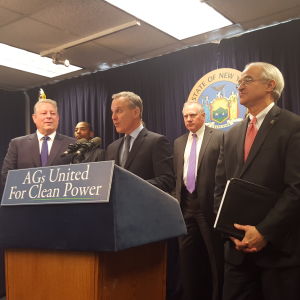This election season has created an unprecedented alliance between the environmental Left and the anti-free market movement. The result is a well-funded juggernaut adept at conducting coordinated and sophisticated assaults on American businesses while attempting to influence crucial elections. Their goals are nothing short of shuttering our American manufacturing industry, halting the production of affordable energy and placing a ruling clique of radicals in office.
One such tactic focuses on intimidating universities and other institutions into divesting their financial holdings of fossil fuel investments. Activists behind this campaign talk candidly about how they hope to “revoke the social license” of energy companies and turn them into “pariahs.” Thanks to robust energy production and a free-market economy, the divestment campaign has achieved mixed success. Just recently Stanford University announced it will retain its investments in fossil fuel stocks – much to the dismay of billionaire environmental activist Tom Steyer who was left red-faced by his alma mater’s announcement. Stanford’s decision to ignore environmentalist rants is the latest rejection by a number of prestigious universities that have decided to keep their coal, oil and natural gas investment assets.
This ultra-liberal alliance is also boldly trying to prosecute their political opponents who hold dissenting views on climate change. More than a dozen Democratic attorneys general and former Vice President Al Gore recently held a press conference announcing a multi-state investigation of ExxonMobil, alleging some cockamamie cover-up of climate data. What is now known is that beforehand, two environmental activists had made a secret, closed-door presentation on “climate change litigation” to state prosecutors by invitation of the New York attorney general’s office.
Actual criminal prosecution of Exxon over climate change is highly unlikely, especially now that the secret collusion between radical environmentalists and several attorneys general has been exposed. But it’s another classic example of the left’s war on energy and how they will stop at nothing to tarnish the name and reputation of a large energy company for pure political gain.
In addition, the state-level rollout of the ExxonMobil assault model has already begun. Last year, regulators in North Carolina haphazardly declared that drinking water in wells located near coal ash storage sites operated by Duke Energy was unsafe. When do-not-drink warning letters were mailed to residents near the sites, the outcry against Duke Energy was immediate. Eventually, the truth came out, as it often does. Further tests – conducted independently – of drinking water across North Carolina discovered that water taken from city-run facilities was no different from water sampled near Duke Energy’s coal ash storage sites. Embarrassed regulators had to recant their scare tactics and rescind their warning. The NC legislature is now looking at a law to prevent this blunder from occurring again.
Yet even now, North Carolina regulators are preparing their assessment which grades Duke Energy’s coal ash storage sites. And the process is predictably rife with politics. Coal ash is a byproduct of coal used to produce energy, and Duke Energy is doing a more-than-responsible job of storing coal ash at several facilities around the state. One would hope that the review of Duke’s coal ash storage sites is factually based and evenhanded. If state officials don’t act responsibly and choose to indiscriminately punish Duke Energy over coal ash storage, then the clear message sent to investors and potential business developers is “Find another state in which to invest, create jobs and offer opportunities for residents.”
These volleys at Duke Energy reveal how environmentalists work to accuse, label and condemn with nothing more than unsubstantiated allegations. This won’t be the last trumped-up charge leveled against Duke Energy this election season, as the environmental left’s attack plan is crystal clear. Gov. Pat McCrory – a former longtime Duke employee – is up for reelection. We can expect numerous ads and commentary designed to pick off the Republican governor while impugning the reputation of a major energy producer in the process.
A more thoughtful discussion on how to balance the production of affordable, reliable energy while addressing the very real concerns about protecting our environment is long overdue. Launching baseless claims against office-seekers or seeking to tarnish the reputations of energy companies – which provide Americans with good-paying jobs – neither advances the political process nor fosters an environment for civil discourse.

